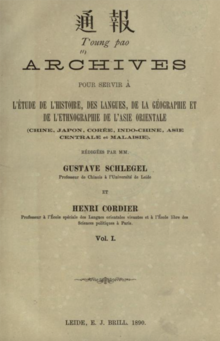T'oung Pao

Cover of first volume (1890)
|
|
| Discipline | Sinology |
|---|---|
| Language | English, French, and German |
| Edited by | Pierre-Étienne Will, Martin Kern, and Paul Kroll |
| Publication details | |
| Publisher | |
|
Publication history
|
1890-present |
| Frequency | 5 issues per year |
| Indexing | |
| ISSN |
0082-5433 |
| Links | |
| T'oung Pao | |||||||||||||
| Traditional Chinese | 通報 | ||||||||||||
|---|---|---|---|---|---|---|---|---|---|---|---|---|---|
| Simplified Chinese | 通报 | ||||||||||||
|
|||||||||||||
| Transcriptions | |
|---|---|
| Standard Mandarin | |
| Hanyu Pinyin | Tōngbào |
| Gwoyeu Romatzyh | Tongbaw |
| Wade–Giles | T'ung pao |
| IPA | [tʰʊ́ŋ.pâu] |
T’oung Pao ([tʰʊ́ŋ.pâu]; Chinese: 通報; pinyin: Tōngbào; literally: "Messages, Circulars"), founded in 1890, is a Dutch journal and the oldest international journal of sinology.
T'oung Pao's original full title was T’oung Pao ou Archives pour servir à l’étude de l’histoire, des langues, la geographie et l’ethnographie de l’Asie Orientale (Chine, Japon, Corée, Indo-Chine, Asie Centrale et Malaisie) ("Tongbao or Archives for Use in the Study of the History, Languages, Geography, and Ethnography of East Asia [China, Japan, Korea, Indochina, Central Asia, and Malaysia]"). It is published by the Leiden publisher E. J. Brill.
The first co editors-in-chief were Henri Cordier and Gustav Schlegel. Traditionally, T'oung Pao was co-edited by two sinologists, one from France and one from the Netherlands. However, the tradition has been discontinued: the current editors are Pierre-Étienne Will (French – Collège de France), Martin Kern (German – Princeton University), and Paul Kroll (American – University of Colorado Boulder).
...
Wikipedia
